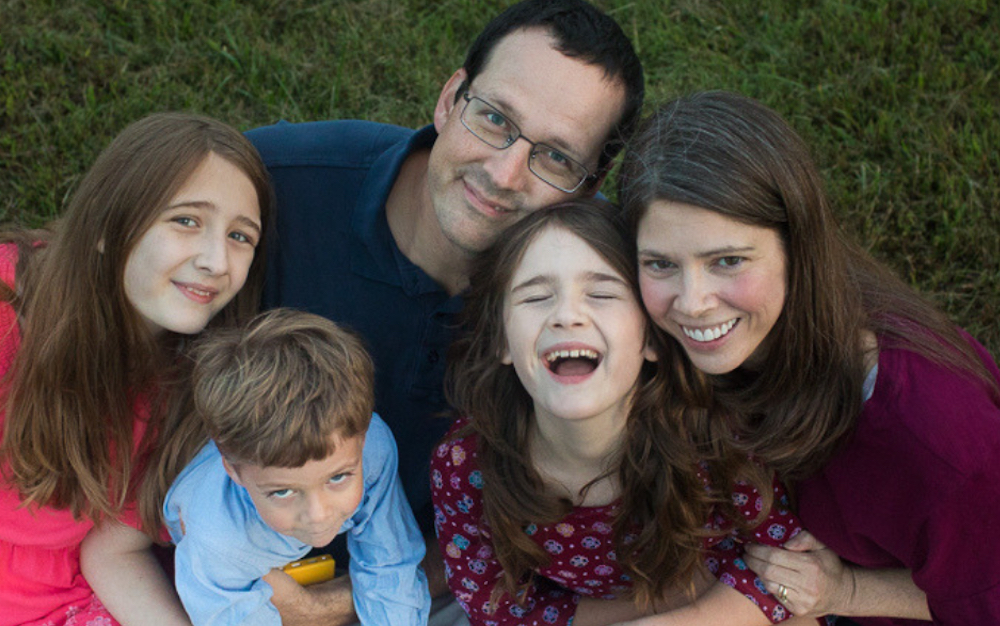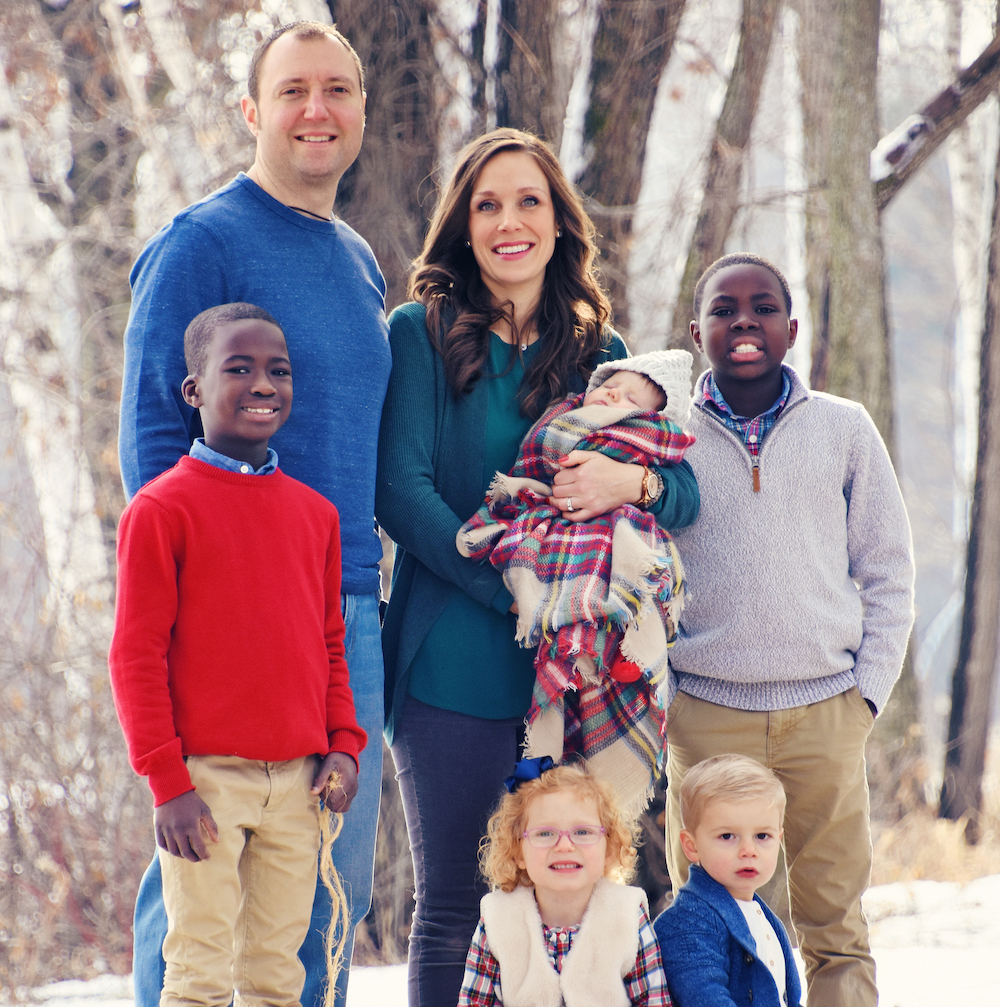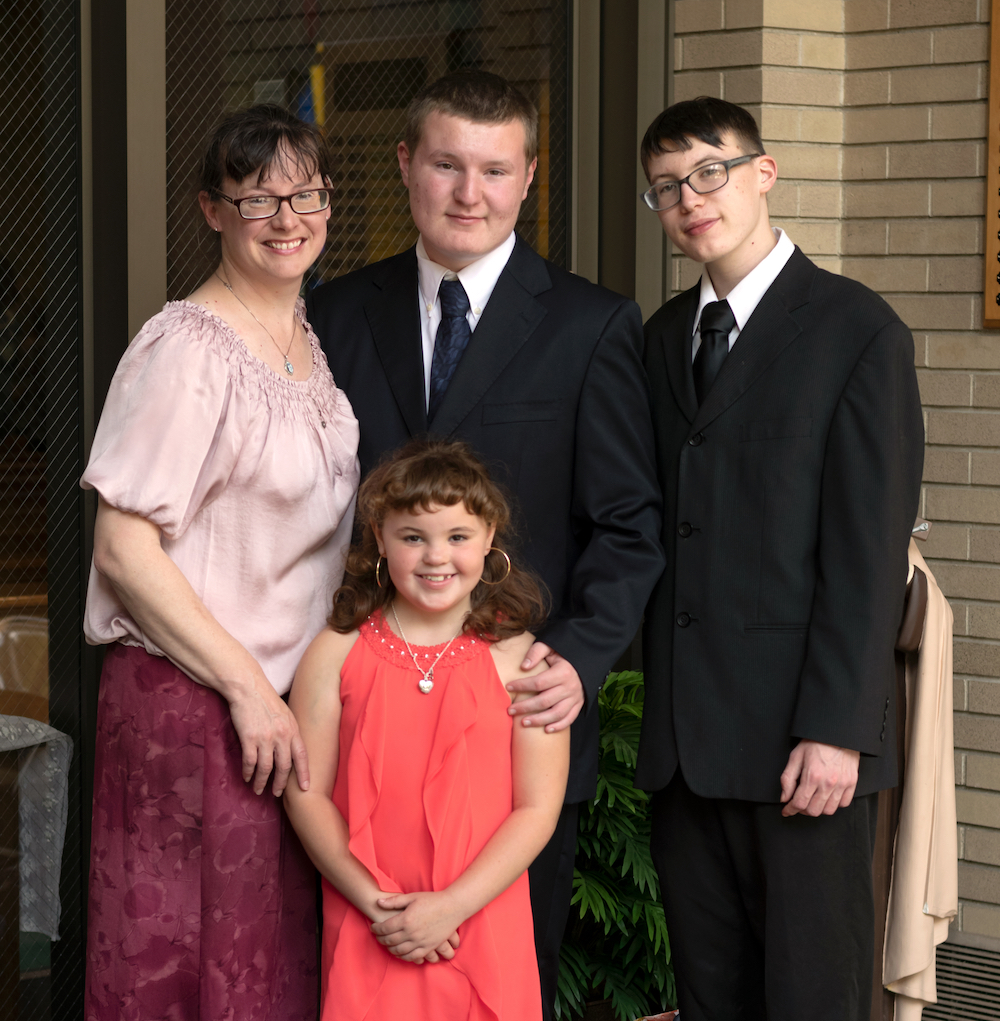
The Kochis family is pictured in Manassas, Virginia, during fall of 2018. From left to right: Gray,13, Finley, 5, Dan, Brinson, 9, and Ginny. (Rachel Cupps Photography)
In just a few years, Cassie Everts' life changed dramatically.
For the first eight years of her marriage, Everts worked full-time while struggling with infertility and miscarriages. In January 2015, she and her husband traveled to Ghana to adopt two boys, ages 4 and 5. The oldest told them he was praying for a sister almost as soon as he could speak English.
In May of the same year, Everts found out she was pregnant. Her son was right; he had a little sister. Everts went on to give birth to a son in 2017 and to another daughter in October 2019.
Now a full-time mother of five children, Everts feels she is fulfilling her vocation, but admits that it isn't always easy.
"Motherhood is incredibly beautiful, but being at home can kind of feel isolating at times," she said. "There's no bonus or raise or 'way to go' " for a job well done.
Isolation is a common theme for Catholic stay-at-home mothers describing their experiences, both in online posts and in conversations with NCR. They might be referring to entire weekdays spent without adult conversation, trying to raise faithful children in an increasingly secular society or feeling like they don't have a typical Catholic family.
But one thing that helps mothers escape isolation is the community they build online. Blogs, Facebook groups and Catholic websites can provide social interaction on days when it's difficult to leave the house; can create a forum for prayers, advice and encouragement; and can help mothers make time for their own spiritual practice.
The internet also helps Catholic mothers connect with others who face specific issues that are seldom seen — or at least seldom discussed — in their local peer groups. Catholic motherhood blogs, in particular, cover niches such as Catholic crafts, homeschooling, children with special needs, natural living, single parenting, breastfeeding or fitness.
Of course, Catholic mothers might look for guidance on multiple topics at the same time. Patrice Fagnant-MacArthur, a freelance writer and editor, said parenting challenges she has faced include being responsible for her children's education and caring for children with special needs.

The Everts family is pictured during December 2019. (Pamela H. Photography)
Fagnant-MacArthur has homeschooled all three of her children, though her oldest son, 18, has now graduated from high school, and her younger son, 17, is doing dual-enrollment at the local community college. Her oldest is on the autism spectrum, and her daughter, 9, is adopted; both have specific needs, Fagnant-MacArthur said.
"Being with your children all the time and not having that break of being with other adults," can also be difficult, Fagnant-MacArthur said, and so is "raising your children in the faith today when the world is so secular and can seem anti-faith. It's good to be in contact with other mothers that are fighting the same battle."
Fagnant-MacArthur runs Today's Catholic Homeschooling, a website that collects resources for Catholic homeschooling parents, and she edited and contributed to a detailed Catholic homeschooling resource guide.
For her own support, Fagnant-MacArthur said she first turned to CatholicMom.com, where she is now a contributor. The website brings together perspectives from dozens of contributors — including many who also run their own blogs — on a wide variety of topics.
On one day in January, the CatholicMom.com homepage featured Scripture reflections, recipes for meatless Fridays, multiple seasonal reflections, sections on various types of media, an invitation to participate in a family novena, even a piece about spiritual lessons one mom gleaned from watching her son coach his younger brother through the hot wing challenge.
Advertisement
The website feels set apart from many of the debates within the church and society. It's difficult to find any criticism of church teaching, yet also rare to find a reference to or rebuttal of such criticisms. One recent exception is a review of a book on the Second Vatican Council that alludes to those who reject the council and argues for Vatican II's continuity with earlier tradition.
According to its "About" page, the website was founded by Lisa Hendey in 2000 and is now supported by Holy Cross Family Ministries.
Another website for Catholic women, FemCatholic, includes a section on motherhood and one called SAHM Life specifically for stay-at-home moms. In line with the site's Catholic feminist perspective, articles in the SAHM life section include "SAHM feminism" and "How becoming a feminist affected my marriage."
The author of the latter article, Charlene Bader, (also a CatholicMom.com contributor) seems more willing than most to touch on political topics and lists current events and social justice among her areas of interest. One of her articles on her personal blog, posted with no indication it was published elsewhere, is about why a pro-life Catholic might vote for a pro-choice politician.
Compared to CatholicMom.com, FemCatholic also seems more inclined to engage with controversial topics. Contributors typically come down firmly on the side of church teaching, but often push back against rigid gender roles or certain views of complementarity, women's subordination and purity culture.
But day-to-day joys and struggles are one of the most common topics of Catholic motherhood sites, especially for those mothers who face unique challenges.
Ginny Kochis, a writer and Catholic homeschooling mother of three, started her blog, "Not So Formulaic" after she discovered a gap in the support system for Catholic mothers.
When her children were young, it seemed that other Catholic families had "perfect children" while hers exhibited bewildering behavior. Her oldest daughter in particular seemed well ahead of her peers in some ways, yet had "massive meltdowns" and struggled in the classroom.
"I felt like a total failure as a mom," Kochis said. While she knew of popular Catholic mom blogs, there was "a lack of resources for Catholic moms like me."
As Kochis started to learn what was going on with her children, she realized she shouldn't see herself or her children as broken. "I needed to learn to love and accept the child that God had given me," Kochis said.
She now knows that her oldest, 13, is on the autism spectrum while her younger daughter, 9, has anxiety and obsessive-compulsive disorder. Her son, 5, is gifted like his sisters and so far seems "the most neurotypical of the bunch," she said.
To help other mothers avoid the feelings of isolation and brokenness that she experienced, Kochis started writing about her experiences and building an online Catholic community of mothers.

Patrice Fagnant-MacArthur, left, is pictured with her children Isaac McArthur, back row, center, David MacArthur, right, and Amariah MacArthur, front, at Isaac's confirmation May 2019 in Springfield, Massachusetts. (Bernard MacArthur)
Not So Formulaic focuses on raising "exceptional" or "differently-wired" children and features sections on Catholic motherhood, homeschooling and "gifted and twice exceptional parenting." Often abbreviated as 2E, "twice exceptional" refers to children who are gifted in some areas but face challenges in others.
While Kochis originally compartmentalized her writing about gifted parenting and Catholic motherhood, she realized there was a group of women who "didn't have a space" or "a group that particularly represented them."
Much of her writing now focuses on being a Catholic mother to 2E children, such as keeping gifted children in the faith even though they are statistically more likely to leave, or practicing "liturgical living" — a popular concept on Catholic motherhood blogs that emphasizes celebrating liturgical seasons and feast days in everyday life — with children who have special needs.
For example, her younger daughter finds Good Friday and Holy Thursday services overwhelming and intensely emotional, Kochis said, so the family chooses other activities that "respect who God has made her to be but also lets her participate in the richness of our faith."
Much like Kochis, Everts began writing and blogging after she had a hard time finding a book or group that addressed the specific challenges she faced.
"When I went through my miscarriages it was hard to find support," she said. "It just wasn't talked about … I definitely felt alone in those times."
Everts co-authored "Nursery of Heaven: Miscarriage, Stillbirth and Infant Loss in the Lives of the Saints and Today's Parents," and her writing on her blog, "everyday Ann," and CatholicMom.com, where she is a contributor, often touches on the same subject.
"When we were going through our journey of miscarriages and infertility, [my blog] was an outlet for me," Everts said. She found her writing "therapeutic" but also wanted others to read it and feel "that they're not alone."
Even aside from those experiences, Everts emphasized community as a way to support mothers during the day-to-day work of motherhood, which she said can feel unimportant, devalued, lonely or "like you are going against the norm."
In society "worth is placed on what you do and how much you can do and what you contribute," Everts said, but "as a mother, there's no instant results."
After days spent changing diapers, doing laundry and cleaning up messes, support from her husband or online groups provides reinforcement that her work is meaningful.
Choosing to be a stay-at-home mom because she believes it is best for her family is "not just something I'm doing to pass time but a vocation, a calling," Everts said. "By shaping these souls, I'm changing the world."
Not just for children
Everts, Fagnant-MacArthur and Kochis also turn to online communities — alongside more local, in-person support networks — to meet their own spiritual needs.
Everts mentioned Blessed Is She, an online community for Catholic women based in the Phoenix Diocese that focuses on daily Scripture reflections, as one site that has been helpful. She likes that she can squeeze in the reflections while the kids are napping.
Kochis said that having children makes it more difficult to fit in spiritual practices. But it's also particularly important to schedule it in or incorporate it into daily life — such as saying Hail Marys when her children fight — because children learn by example, she said.
Being a Catholic mom who is supporting others — as she does through Not So Formulaic — can make maintaining a faith life even harder because "you're pouring a lot out of yourself," Kochis said. But at other times, she draws strength from the prayers of women in the community.
Motherhood itself has also contributed to her faith life, said Kochis, who described herself pre-children as a "selfish, selfish person" who thought she knew everything.
"God has really used my children to make me a better person," she said. "They sanctify me and help me walk the path to spiritual growth."
[Maria Benevento is a graduate student at the Missouri School of Journalism at the University of Missouri, Columbia, and covers the Missouri state legislature. She is a former NCR Bertelsen intern.]








